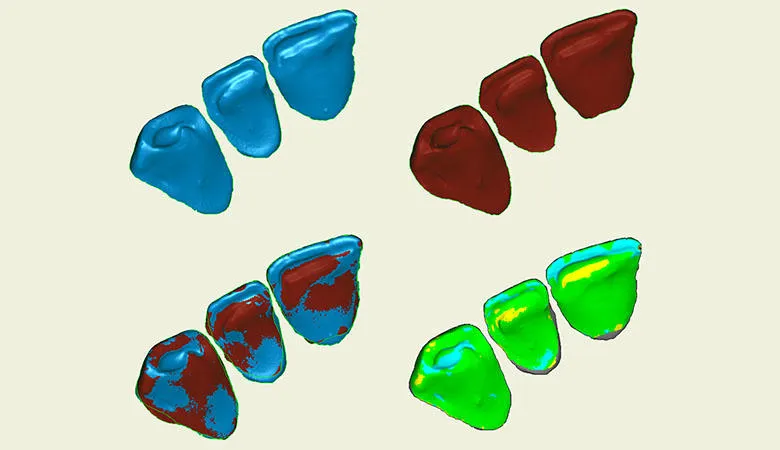Our world leading team researches the detection, diagnosis, measurement, prevention and treatment of erosive tooth wear. Our expertise spans epidemiology, measurement with industry standard profilometers, interaction with saliva, pellicle and gastric causes, patient-based studies and treatment outcomes. This involves laboratory methods using state of the art precision measurement and salivary research, in situ methods and clinical studies. Our team works successfully with industry who have funded most of our PhD students.
Image: Measurement of anterior wear in vivo

Projects
Measurement and simulation of erosive tooth wear progression on natural surfaces in vitro
For decades, in vitro erosive tooth wear research has focused on polished dental surfaces which often behave differently to natural enamel and exposed dentine surfaces. Until now, it has been difficult to detect changes on natural surfaces at a micron level. Pioneering metrology research at our lab has overcome this barrier meaning we are able to examine how the erosive tooth wear lesion progresses and the effect of oral health products intervention for the first time on a native surface.
Measurement of erosive tooth wear progression in vivo
Our team uses multiple engineering-based registration and measurement software to superimpose scans of patient’s teeth taken at separate time points and quantify the erosive tooth wear progression over time. We have used this methodology to show the positive effect of dietary behaviour change over a 6-month period. We are currently focusing on detecting the minimal amount erosive tooth wear that an intraoral scanner can detect in addition to improving the accuracy of scan registration algorithms. Together with Leeds University, we have released a custom-built freeware for quantifying erosive tooth wear progression.

Risk factors for ETW in patients with gastro-oesophageal Reflux Disease (GORD) and the role of saliva and pellicle
This project involves clinical study recruiting patients with symptoms of GORD and assessing their risk of developing ETW using symptom analysis, results of manometry and pH tests and collection of pellicle. This project is carried out in collaboration with the oesophageal laboratory at Guy’s Hospital.
Publications
Awards
2005-2005
GlaxoSmithKline “A comparison of the effects of NaF- and MFP-containing toothpastes on interproximal plaque composition and acidogenicity”.
D Bartlett and D Beighton (PI) £70,000
2007-2008
Glaxo SmithKline. Epidemiology of tooth wear in adults
D Bartlett(PI) £65,000
2008-2008
Glaxo SmithKline. Laboratory measurement of acid erosion.
D Bartlett (PI) £25000
2009 -2011
Colgate: Formation of salivary protein pellicles and prevention of dental erosion
G Carpenter and R Moazzez (Joint PIs),G Proctor, D Bartlett £215,000
2009-2010
GSK Role of denture fixatives and diet.
D Bartlett(PI) , J Thomas (Dept of Nutrition, King's) M Fenlon £120,000
2010-2011
GSK Comparison of dentine occlusion by toothpaste in-situ
D Bartlett (PI) and R Moazzez £130,000
2011-2012
GSK Comparison of dentine occlusion by toothpaste in-situ II
D Bartlett (PI) and R Moazzez £150,000
2010-2012
Colgate Salivary factors in dental erosion.
G Carpenter, R Moazzez, D Bartlett, G Proctor £135,000
2011-2012
University of Lyon – 7 European countries prevalence of dentine sensitivity and erosion
D Bourgeios, N West, A Lussi D Bartlett (£18,000 to King's) £300,000
2012-2014
Academy of Dental Sciences
R Austin (PI), D Bartlett, R Moazzez
Starter grant for research for Rupert Austin £30,000
2012-2015
Sponsored PhD by Proctor and Gamble
D Bartlett (PI) and R Moazzez £150,000
2013-2015
Salivary factor in dental erosion Colgate (co-investigator) £284,000
2014-2017
Proctor and Gamble Randomised Clinical Trial on progression of tooth wear
D Bartlett and R Moazzez £140,000
2014-2017
GSK funded PhD project on surface roughness and clinical study
£200,000
2016-2019
Unilever funded PhD project on the early erosive lesion
£200,000
Academy of Medical Sciences, Saoirse O’Toole £24,000
MRC/GSK iCase PhD studentship on META – measuring erosive tooth wear accurately. An in vitro investigation assessing the accuracy of intra oral scanners and how they may be used to measure erosive tooth wear on natural teeth. £100,000
BBSRC/Unilever iCase Studentship continuing META - Measuring erosive tooth wear accurately. An in vitro investigation comparing the effects of abrasion and erosion on natural teeth funded by the BBSRC and Unilever. £100,000
Activities

Clinical trials and studies on oral health
Working closely with our Oral Clinical Research Unit, we are interested in testing interventions for erosive tooth wear progression. To date this has involved dentifrices, mouthrinses, dentine bonding agents and fissure sealants using both in situ and in vivo clinical studies. Our large and diverse patient group facilitates efficient recruitment and our team is very experienced in the effective management and reporting on clinical trials

Oral health commercial partners
The group have had several collaborations with various oral health commercial partners in finding solutions for prevention and management of progression of ETW. The partnerships have led to many publications and contributions to furthering knowledge and understanding of the condition as well as clinical trials investigating how oral health products work, how they can be optimised and evaluation of the new products on the market for effectiveness and safety.
Erosive Tooth Wear Foundation
Erosive Tooth Wear (ETW) represents a range of conditions where the shape and height of teeth can be lost over time, giving individuals a series of challenges with function, appearance and sensitivity to temperature change. It is not related to tooth decay (dental caries). ET can represent a major problem for both individuals and communities, but the evidence behind this condition, and treatment options for it, are often poorly understood. There are currently many barriers which prevent the knowledge we have from basic and clinical research translating into improved health. The aim of this initiative is, for Erosive Tooth Wear, to promote understanding of the condition, the underlying science, the scale of the problem and how best to prevent and, where appropriate, manage it.

Erosive Tooth Wear Foundation
Erosive Tooth Wear can cause major problems for both individuals and communities. Often the causes and treatment options are poorly understood. To help break down these barriers and ensure research from King’s is translated into better health, King’s Professor Bartlett, Head of Prosthodontics and Professor Nigel Pitt, Academic Lead for Impact worked with leading academics from across Europe, to establish the Erosive Tooth Wear Foundation in 2018, a registered UK charity.
Projects
Measurement and simulation of erosive tooth wear progression on natural surfaces in vitro
For decades, in vitro erosive tooth wear research has focused on polished dental surfaces which often behave differently to natural enamel and exposed dentine surfaces. Until now, it has been difficult to detect changes on natural surfaces at a micron level. Pioneering metrology research at our lab has overcome this barrier meaning we are able to examine how the erosive tooth wear lesion progresses and the effect of oral health products intervention for the first time on a native surface.
Measurement of erosive tooth wear progression in vivo
Our team uses multiple engineering-based registration and measurement software to superimpose scans of patient’s teeth taken at separate time points and quantify the erosive tooth wear progression over time. We have used this methodology to show the positive effect of dietary behaviour change over a 6-month period. We are currently focusing on detecting the minimal amount erosive tooth wear that an intraoral scanner can detect in addition to improving the accuracy of scan registration algorithms. Together with Leeds University, we have released a custom-built freeware for quantifying erosive tooth wear progression.

Risk factors for ETW in patients with gastro-oesophageal Reflux Disease (GORD) and the role of saliva and pellicle
This project involves clinical study recruiting patients with symptoms of GORD and assessing their risk of developing ETW using symptom analysis, results of manometry and pH tests and collection of pellicle. This project is carried out in collaboration with the oesophageal laboratory at Guy’s Hospital.
Publications
Awards
2005-2005
GlaxoSmithKline “A comparison of the effects of NaF- and MFP-containing toothpastes on interproximal plaque composition and acidogenicity”.
D Bartlett and D Beighton (PI) £70,000
2007-2008
Glaxo SmithKline. Epidemiology of tooth wear in adults
D Bartlett(PI) £65,000
2008-2008
Glaxo SmithKline. Laboratory measurement of acid erosion.
D Bartlett (PI) £25000
2009 -2011
Colgate: Formation of salivary protein pellicles and prevention of dental erosion
G Carpenter and R Moazzez (Joint PIs),G Proctor, D Bartlett £215,000
2009-2010
GSK Role of denture fixatives and diet.
D Bartlett(PI) , J Thomas (Dept of Nutrition, King's) M Fenlon £120,000
2010-2011
GSK Comparison of dentine occlusion by toothpaste in-situ
D Bartlett (PI) and R Moazzez £130,000
2011-2012
GSK Comparison of dentine occlusion by toothpaste in-situ II
D Bartlett (PI) and R Moazzez £150,000
2010-2012
Colgate Salivary factors in dental erosion.
G Carpenter, R Moazzez, D Bartlett, G Proctor £135,000
2011-2012
University of Lyon – 7 European countries prevalence of dentine sensitivity and erosion
D Bourgeios, N West, A Lussi D Bartlett (£18,000 to King's) £300,000
2012-2014
Academy of Dental Sciences
R Austin (PI), D Bartlett, R Moazzez
Starter grant for research for Rupert Austin £30,000
2012-2015
Sponsored PhD by Proctor and Gamble
D Bartlett (PI) and R Moazzez £150,000
2013-2015
Salivary factor in dental erosion Colgate (co-investigator) £284,000
2014-2017
Proctor and Gamble Randomised Clinical Trial on progression of tooth wear
D Bartlett and R Moazzez £140,000
2014-2017
GSK funded PhD project on surface roughness and clinical study
£200,000
2016-2019
Unilever funded PhD project on the early erosive lesion
£200,000
Academy of Medical Sciences, Saoirse O’Toole £24,000
MRC/GSK iCase PhD studentship on META – measuring erosive tooth wear accurately. An in vitro investigation assessing the accuracy of intra oral scanners and how they may be used to measure erosive tooth wear on natural teeth. £100,000
BBSRC/Unilever iCase Studentship continuing META - Measuring erosive tooth wear accurately. An in vitro investigation comparing the effects of abrasion and erosion on natural teeth funded by the BBSRC and Unilever. £100,000
Activities

Clinical trials and studies on oral health
Working closely with our Oral Clinical Research Unit, we are interested in testing interventions for erosive tooth wear progression. To date this has involved dentifrices, mouthrinses, dentine bonding agents and fissure sealants using both in situ and in vivo clinical studies. Our large and diverse patient group facilitates efficient recruitment and our team is very experienced in the effective management and reporting on clinical trials

Oral health commercial partners
The group have had several collaborations with various oral health commercial partners in finding solutions for prevention and management of progression of ETW. The partnerships have led to many publications and contributions to furthering knowledge and understanding of the condition as well as clinical trials investigating how oral health products work, how they can be optimised and evaluation of the new products on the market for effectiveness and safety.
Erosive Tooth Wear Foundation
Erosive Tooth Wear (ETW) represents a range of conditions where the shape and height of teeth can be lost over time, giving individuals a series of challenges with function, appearance and sensitivity to temperature change. It is not related to tooth decay (dental caries). ET can represent a major problem for both individuals and communities, but the evidence behind this condition, and treatment options for it, are often poorly understood. There are currently many barriers which prevent the knowledge we have from basic and clinical research translating into improved health. The aim of this initiative is, for Erosive Tooth Wear, to promote understanding of the condition, the underlying science, the scale of the problem and how best to prevent and, where appropriate, manage it.

Erosive Tooth Wear Foundation
Erosive Tooth Wear can cause major problems for both individuals and communities. Often the causes and treatment options are poorly understood. To help break down these barriers and ensure research from King’s is translated into better health, King’s Professor Bartlett, Head of Prosthodontics and Professor Nigel Pitt, Academic Lead for Impact worked with leading academics from across Europe, to establish the Erosive Tooth Wear Foundation in 2018, a registered UK charity.
Our Partners
The Erosive Toothwear Foundation
University of Leeds Digital Dentistry
University of Southampton

National Physics Laboratory
Group leads
Contact us
Group PI's:
Professor David Bartlett
Professor Rebecca Moazzez
Dr Rupert Austin
Dr Saoirse O'Toole
Centre for Oral, Clinical & Translational Sciences







